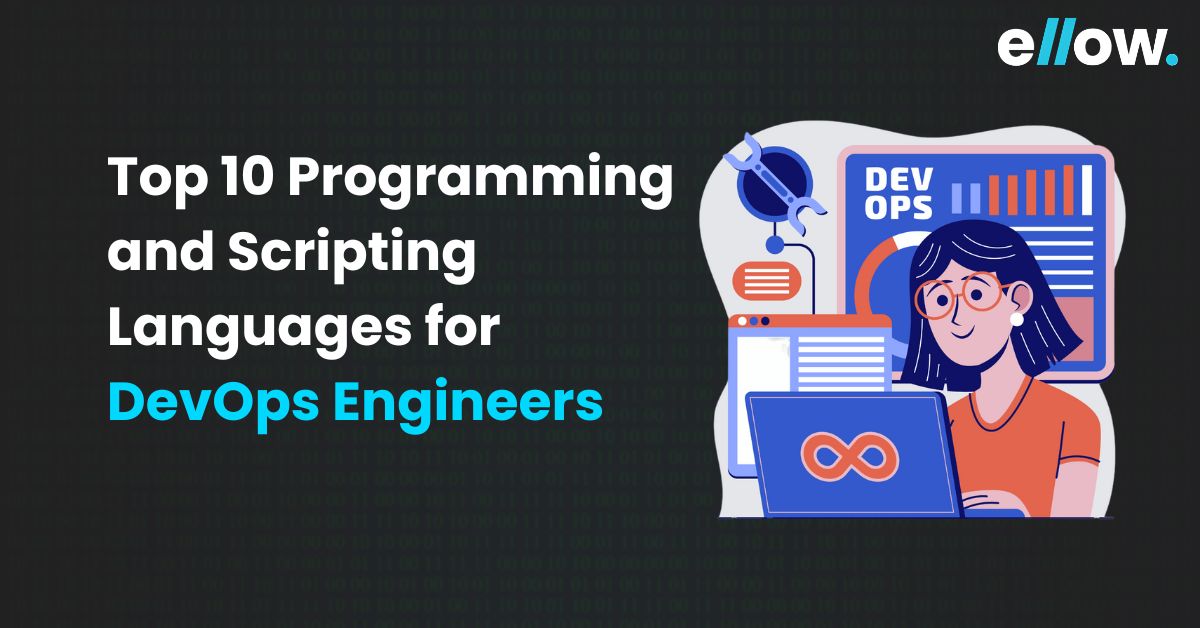Let’s build the future together.
Great ideas need great people. Partner with us to bring your vision to life, or take the first step in your career by joining our team of innovators.

DevOps, (Development and Operations), is an ever-evolving field that lays emphasis on collaboration, communication, and the continuous improvement of software development and deployment processes. As such, DevOps engineers should acquire proficiency in various programming and scripting languages. Proficiency in these languages speeds up the software release cycle and ensures frequent deliveries.
DevOps, short for “Development” and “Operations,” is a modern approach to software development and IT operations. It is all about making the process of building, testing, and deploying software faster and more efficient. Instead of treating development and operations as separate fields, DevOps encourages collaboration between these teams.
It emphasizes automation, allowing for quicker releases and fewer errors. With DevOps, everyone is able to streamline workflows, improve communication, and use tools to automate manual tasks. This results in more reliable software, quicker updates, and happier teams, ultimately benefiting businesses and end-users alike.
DevOps revolutionizes how software is developed, deployed, and maintained, giving us more efficient and reliable software solutions.
To understand the industry’s current state, you must investigate the stats and latest trends. So, here is a great read from Radixweb, Top DevOps Stats That You Cannot Miss.
A programming language is a special code that communicates with a computer. It is the language computers understand, and it is used to create all sorts of programs and applications.
It is like the building blocks of software. Each programming language has its own rules and style. Some of the most popular examples of programming languages are C, C++, and Java.
A scripting language is a tool for building web applications and similar software. Instead of directly turning high-level code into machine language, it uses an interpreter. Examples include JavaScript, PHP, Python, and BASH. These languages can be used alongside other programming languages, like HTML or Java, to add versatility to software development.
Programming languages are used to develop software with compiled code, converting high-level code to machine code before execution.
Scripting languages, on the other hand, are interpreted and used for tasks like automating repetitive actions or adding functionality to existing software, without the need for compilation.
| Feature | Programming Languages | Scripting Languages |
| Compilation | Typically compiled into bytecode or machine code. | Interpreted, often executed line-by-line at runtime. |
| Performance | Generally faster due to prior compilation. | Slower due to on-the-fly interpretation. |
| Development Cycle | Compile then execute cycle. | Usually more immediate: write then run. |
| Use Cases | System programming, standalone applications, games, and large software systems. | Web development, automation tasks, gluing together processes, and quick prototyping. |
| Examples | C, C++, Java, Fortran. | Python, Perl, JavaScript, Ruby. |
| Integration | Often used to develop core functionalities. | Often used to interface with or glue together different systems. |
| Portability | May require recompilation for different platforms. | Often platform-independent due to reliance on an interpreter. |
| Typing | Can be statically typed (types checked at compile time). | Often dynamically typed (types checked at runtime). |
| Error Detection | Errors (especially type errors) are often caught during compilation. | Errors are typically detected at runtime. |
Check this video out: Scripting Language Vs Programming Language | Difference Between Scripting And Programming Languages
Here are some of the programming and scripting languages for DevOps Engineers:
Python is not only a preferred programming language but also the most used scripting language around the world that is used for automation, scripting, and configuring infrastructure in web development, and its adaptability to these different situations make it a great choice for DevOps teams Python works well on Windows, macOS, and Linux. From website creation to application development, and machine learning, Python has a wide array of applications.
Python is simple and open-source which makes it a popular choice for both beginners and experts. While Python may not be the fastest, it boasts extensive support and a plethora of valuable libraries.
Python is widely used by organizations such as Google, NASA, Dropbox, and Instagram for a variety of applications including web development, scientific research, and data analysis due to its versatility and simplicity.
Java is a programming language that is great for DevOps engineers to learn how to build and maintain robust automation tools and applications. It is very versatile and can be used to create software for different platforms. Many DevOps teams use Java for building web apps because they can easily add it to their existing code. This helps them adopt new technologies without redoing a lot of their already existing code.
Java supports object-oriented programming, has a garbage collection system, can handle multiple tasks at once, and can work with many distributed apps. That is why it is good for server-side apps. Java is commonly used in embedded systems because it lets us connect electronic devices using standard protocols like I2C and SPI.
Many large organizations, including Google, Amazon, and Oracle, rely on Java for various aspects of their software development and infrastructure due to its portability and scalability.
JavaScript is a versatile scripting language used in DevOps to enhance user interactivity and functionality on websites and applications. It enables the creation of dynamic web forms, real-time updates, and interactive features, making it invaluable for automating tasks, managing infrastructure, and ensuring seamless user experiences in the DevOps pipeline.
If someone is new to programming, JavaScript might seem a bit tricky at first. It is a good idea to learn some other languages like Python and Java before learning JavaScript.
JavaScript is widely used by tech giants like Google, Facebook, and Netflix to power their web applications, providing dynamic and interactive user experiences.
Go(Golang), is an open-source, compiled, and statically typed programming language designed by Google. It checks for errors before running, which can help catch problems early. GO runs on the Google Go platform, and it is known for its impressive speed. Developers use it for web apps, command-line tools, and desktop programs.
Google improved Go to make it faster and use fewer resources compared to languages like Java or Python. . Also, unlike JavaScript, Go doesn’t need to be interpreted. When a GO program is compiled, it starts up quickly. Go works well for big software projects and analyzing lots of data. It has features that make it faster, like constant folding and dead code elimination.
Many prominent organizations, including Uber, and Dropbox, use Golang (Go) for its efficiency, concurrency support, and scalability in developing backend systems and microservices.
PHP is the most popular programming and scripting language for web development. Developers use PHP to create different kinds of websites, from small ones like personal blogs to really big ones for businesses.
PHP, both a programming and scripting language, works well for creating both static and dynamic websites. Additionally, PHP enables developers to seamlessly include payment processors, social media channels, and widgets in their web applications.
Developers independently work with PHP, but they also combine it with other scripting languages such as JavaScript and SQL. When PHP is used together with these languages, it helps to create a more comprehensive and versatile website.
Many large organizations use PHP, including Facebook, which developed the language, and WordPress, which powers a significant portion of the internet’s websites.
PERL is a versatile scripting language that can aid DevOps engineers in various tasks. A DevOps engineer uses PERL for various tasks like web development, data analysis, networking, system administration, and machine learning. In web development, PERL can help create web applications and websites. It is flexible and can adapt to different web development needs. PERL is great for analyzing data. It can handle large datasets and perform calculations efficiently.
PERL can assist in automating network tasks, making the job easier. It is a reliable choice for system administration tasks. It can automate repetitive tasks and maintain system stability. While it is not the top choice for machine learning, PERL can still be used for basic ML tasks and data processing. PERL frameworks consist of modules that work together to build complex applications. These frameworks are designed to simplify the development process.
Organizations such as Amazon, Booking.com, and Craigslist use Perl for various tasks, including web development, automation, and system administration due to its powerful text processing capabilities and versatility. Perl continues to be a preferred language for scripting and handling complex data-parsing tasks.
Ruby is a popular scripting language that many prefer for automating tasks. It is dynamic, easy to learn, and versatile, making it an excellent choice for web development, data science, and unit testing. Ruby is a top choice for beginners because it is easy to learn. DevOps engineers find Ruby useful for creating small web applications like content management systems (CMS). Ruby handles complex applications like messaging platforms and e-commerce websites. It is used to build web services and create APIs (application programming interfaces).
Many organizations, including Airbnb and GitHub, use Ruby for web development and to build scalable and user-friendly platforms. Ruby’s elegant syntax and Rails framework make it a popular choice for rapid development and prototyping.
Bash scripts, also known as Linux Shell Scripting, are essential tools to help automate tasks like installations and configuration management. DevOps engineers rely on Bash to craft deployment scripts, simplifying the process of releasing new applications. Bash scripts are useful for many DevOps tasks due to their speed and simplicity.
Bash is widely used by many organizations, including tech giants like Google and Facebook, for various system administration and automation tasks due to its versatility and compatibility with Unix-based systems. Additionally, many Linux distributions, such as Ubuntu and CentOS, rely heavily on Bash for system-level scripting and management.
If you are a DevOps engineer working on Windows servers, Powershell is the best friend for the engineers. Powershell is a tool from Microsoft that helps to automate tasks, write scripts, and manage configurations. It works smoothly with Windows systems. It can be used for crunching numbers and analyzing data.
Many organizations, including Microsoft, Amazon, and IBM, use PowerShell for automation, configuration management, and system administration tasks due to its versatility and compatibility with Windows environments. PowerShell’s wide adoption extends to industries like tech, finance, healthcare, and beyond.
Groovy is a scripting language that is based on Java, so learning Groovy is easy. It is mainly used for automating tasks in software development, like creating files, compiling code, and running tests. When it comes to DevOps, Groovy is super popular in Jenkins. If you are familiar with Groovy scripting, writing Jenkins pipelines and shared libraries becomes easy. It helps streamline the software development process.
Organizations such as Netflix, which heavily relies on Groovy for its microservices architecture, and Apache Software Foundation, where Groovy is used in various projects, have adopted Groovy as a programming language to enhance their software development and automation processes.
When it comes to choosing the right programming and scripting languages for DevOps engineers, these top 10 can be the go-to options. Python offers simplicity and versatility, while Java brings robustness. JavaScript is crucial for web-related tasks, and Golang excels in performance. PHP and Perl have their specialties, and Ruby offers classy solutions. Bash and PowerShell are essential for scripting and automation, while Groovy is useful for Jenkins and other tools. The best choice depends on the specific needs and preferences.
Top Benefits & Advantages of DevOps
Best programming Languages for Android App Development
Advantages and Disadvantages of PHP
Top 10 PHP Alternatives in 2023
A programming language is applicable for writing code that runs independently. In contrast, a scripting language is best for writing code that runs within another program, such as a web browser or server.
Most studies state that learning a new programming language can take between three to six months, or approximately 500 hours depending on the learner’s pace, language difficulty level, and learning resources available.
In DevOps, several languages are used, but Python and shell scripting are common for automation tasks. Python’s simplicity and extensive libraries make it suitable for various automation scripts, while shell scripting, especially Bash, is essential for Unix-based system tasks. JavaScript is used for web-related DevOps tasks, and Go (Golang) is gaining traction for building efficient tools. The choice depends on the specific automation needs within the DevOps pipeline.
Python is often considered better for DevOps due to its simplicity, versatility, and extensive library support, making it ideal for automation and scripting tasks. It’s widely used for configuration management and orchestration. Java, while powerful, may have a steeper learning curve and is more commonly associated with other development domains. The choice depends on specific project requirements and familiarity with the language.
DevOps is not a programming language; it’s a way of working that brings together development and operations teams to make software delivery faster and more efficient. It uses tools and practices to automate tasks and improve collaboration. While programming languages are used in DevOps, DevOps itself is not one.

Vibe Coding vs AI Assisted Coding: The Difference That Will Define the Next Generation…

From Code Generation to Bug Detection: 10 AI Tools Every Developer Should Know in…

Ten Real-World Ways Enterprises Are Using AI Teams to Build Faster in 2026
Please feel free to share your thoughts and we can discuss it over a cup of tea.
Get a quote
Vibe Coding vs AI Assisted Coding: The Difference That Will Define the Next Generation…

Six Things to Consider When Hiring Remote Talent

ellow.io enters remote hires market with AI-based screening process